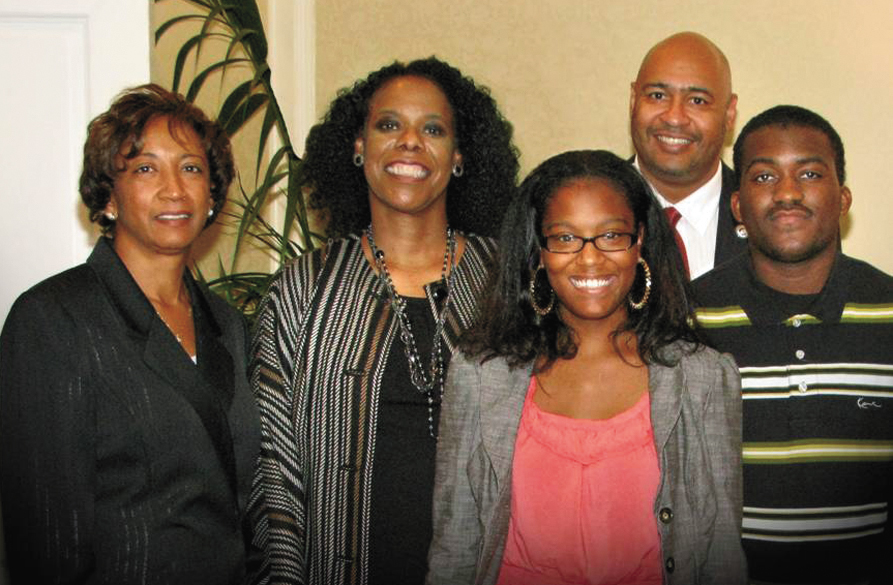 INVOLVED IN THE FIGHT—Some of the individuals working with the Pittsburgh Child Guidance Foundation’s Advocating for Children Whose Parents are Incarcerated initiative at the Oct. 25 PCGF reception. From left: Shirley Moore Smeal, from the Pennsylvania Department of Corrections; Charlotte Brown, PCGF; Ronnell Anderson, an Amachi Ambassador; John Wetzel, Pennsylvania Department of Corrections; and Tirrell Harris, an Amachi Ambassador. (Photo by Andrew Wagner)
INVOLVED IN THE FIGHT—Some of the individuals working with the Pittsburgh Child Guidance Foundation’s Advocating for Children Whose Parents are Incarcerated initiative at the Oct. 25 PCGF reception. From left: Shirley Moore Smeal, from the Pennsylvania Department of Corrections; Charlotte Brown, PCGF; Ronnell Anderson, an Amachi Ambassador; John Wetzel, Pennsylvania Department of Corrections; and Tirrell Harris, an Amachi Ambassador. (Photo by Andrew Wagner)
The Pittsburgh Child Guidance Foundation’s Advocating for Children Whose Parents are Incarcerated initiative has worked diligently to understand, communicate and ease the loss children face when losing a parent, or in some cases parents, to incarceration. Now, almost ten years later, the initiative can celebrate its successes as they come to a close. At a press conference held late last week, the organization highlighted some of the accomplishments it has made.
“We have helped to bring the issues (children face when dealing with a parent’s incarceration) to the forefront and have helped to support the programs of those who are doing the work,” said Claire Walker, executive director of the foundation. “And now people who are doing the work are saying families matter.”
The Foundation, which works to improve and promote the mental and emotional health of children aged 12 and under in Allegheny County through collaborations with various public and private organizations, began its Advocating for Children Whose Parents are Incarcerated initiative in 2003. The initiative, which was only supposed to be six years, was later extended. Over its time, the initiative has partnered with several organizations, published and presented reports and awarded $1 million in grants, all resulting in significant changes in the system.
According to the Foundation, there are 2.7 million children in the United States with a parent in jail or prison, 100,000 in Pennsylvania and 8,500 in Allegheny County alone.
“For the first time in 40 years the rise in the number of children whose parents are incarcerated has begun to level off,” said Charlotte Brown, president of the board of trustees for the Foundation. “Stronger families, means less crime.”
Through its work, along with the work of many others, some of the initiative’s accomplishments include the writing of guidelines and piloting training for law enforcement officials to protect children from trauma when arresting their parents; the developing and contracting of an information specialist to answer phones around the clock and on weekends for children and families to find out if their parent has been brought to the jail for booking and processing; the renovation of the jail lobby waiting room, known as Gwen’s Den after the late and retired Pittsburgh Police Commander Gwendolyn June Campbell Elliott, to be more welcoming for children and families; the creation of a re-entry program to help families and encourage the continued bond between parents and families; developing a discharge center to assist parents in getting him and avoiding an immediate return to jail; judicial and legislative changes; the implementation of an “ombudsman,” an family advocate to help incarcerated parents navigate through the justice and human services systems; and much more.
Anna Hollis, executive director of Amachi Pittsburgh, an organization that mentors to children of incarcerated parents, and a partner of the Foundation, said, “I am extremely pleased at the accomplishments made by the Pittsburgh Child Guidance Foundation.” She added that without the Foundation, she does not think the impact of incarcerations on children would have been so closely evaluated.
Ronell Anderson, a college student, an Amachi Pittsburgh Ambassador and former child of an incarcerated parent, spoke about growing up with a parent in jail and said, “I have learned from their (her parents’) decisions and my siblings have learned from their decisions. We (children of an incarcerated parent) do not want people to stigmatize us for their (parent’s) decisions.”
Now that the Advocating for Children Whose Parents are Incarcerated initiative has come to an end, Walker said in early 2013 the Foundation will examine other issues affecting children and launch a new initiative.
(For more information on the Pittsburgh Child Guidance Foundation, its findings, or accomplishments, call 412-434-1665.)